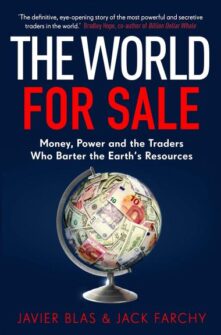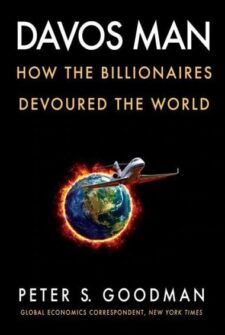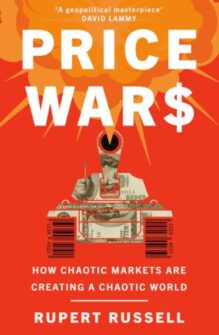Books. Spring Reading.

Three interesting books for this spring.
The modern world is built on commodities – from the oil that fuels our cars to the metals that power our smartphones. We rarely stop to consider where they come from. But we should.
In “The World for Sale”, two leading journalists Javier Blas and Jack Farchy lift the lid on one of the least scrutinised corners of the economy: the workings of the billionaire commodity traders who buy, hoard and sell the earth’s resources.

It is the story of how a handful of swashbuckling businessmen became indispensable cogs in global markets: enabling an enormous expansion in international trade, and connecting resource-rich countries – no matter how corrupt or war-torn – with the world’s financial centres.
And it is the story of how some traders acquired untold political power, right under the noses of Western regulators and politicians – helping Saddam Hussein to sell his oil, fuelling the Libyan rebel army during the Arab Spring, and funnelling cash to Vladimir Putin’s Kremlin in spite of strict sanctions. The result is an eye-opening tour through the wildest frontiers of the global economy, as well as a revelatory guide to how capitalism really works.
Javier Blas and Jack Farchy are journalists at Bloomberg, where Blas is a columnist specialising in energy and commodities while Farchy is a senior report covering natural resource.
The World For Sale, Money, Power nad the Traders Who Barter the Earth’s Resouces,Javier Blas & Jack Farchy, Penguin Books, 2022, London, 410 pages.
The history of the last half-century in America, Europe, and other major economies is in large part the story of wealth flowing upward. The most affluent people emerged from capitalism’s triumph in the Cold War to loot the peace, depriving governments of the resources needed to serve their people, and leaving them tragically unprepared for the worst pandemic in a century.
Drawing on decades of experience covering the global economy, award-winning journalist Peter S. Goodman profiles five representatives “Davos Men” – members of the billionaire class – chronicling how their shocking exploitation of the global pandemic has hastened a fifty-year trend of wealth centralization.

Alongside this reporting, Goodman delivers textured portraits of those caught in Davos Man’s wake, including a former steelworker in the American Midwest, a Bangladeshi migrant in Qatar, a Seattle doctor on the front lines of the fight against COVID, blue-collar workers in the tenements of Buenos Aires, an African immigrant in Sweden, a textile manufacturer in Italy, an Amazon warehouse employee in New York City, and more.
Goodman’s revelatory exposé of the global billionaire class reveals their hidden impact on nearly every aspect of modern society: widening wealth inequality, the rise of anti-democratic nationalism, the shrinking opportunity to earn a livable wage, the vulnerabilities of our health-care systems, access to affordable housing, unequal taxation, and even the quality of the shirt on your back. Meticulously reported yet compulsively readable, Davos Man is an essential read for anyone concerned about economic justice, the capacity of societies to grapple with their greatest challenges, and the sanctity of representative government.
Peter S. Goodman is the Global Economics Correspondent for the New York Times, based in London.
How The Billionaires Devouted The World, Peter S. Goodman, Custom House, 2022, New York, 472 pages.
___________________________________________________________________
War in Ukraine, a global hunger crisis, the West’s cost of living crisis – the eruptions of 2022 were all too predictable. In Price Wars, Rupert Russell lays out just how these crises are connected and how many such events plunged the 2010s into a decade of turmoil.
Entering the eye of the storm – from the trenches of Russian separatist-controlled Donbas to bomb disposal squads in Mosul to cattle raiders in Kenya – Russell discovers a butterfly effect of chaos in the real world being driven by chaos in the commodities markets.

The price of food and oil has the power to bankroll foreign invasions, plunge continents into poverty and spark revolutions, civil wars and refugee crises. And these prices, whistle-blowing hedge fund managers and Nobel Prize winners told him, have become irrational. In this thrilling expose of the dark financial forces that rule our world, Russell takes us on adventure into the inner workings of global disorder unlike any other.
Rupert Russell is a writer and filmmaker. He has filmed in twenty countries and made two award-winning documentaries. He has a PhD in Sociology from Harvard and has published in the Independent, Dazed and Salon. Price Wars is his first book. (Open Photo: 123rf)
Price Wars, How Chaotic Markets Are Creating a Chaotic World, Rupert Russell, Orion Publishing Co, 2023, London, 340 pages.



